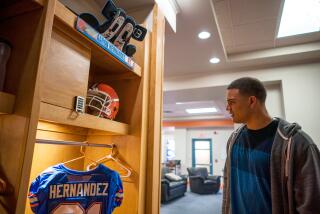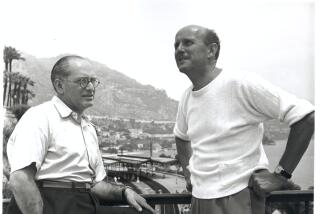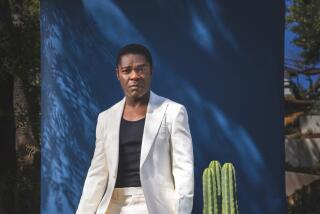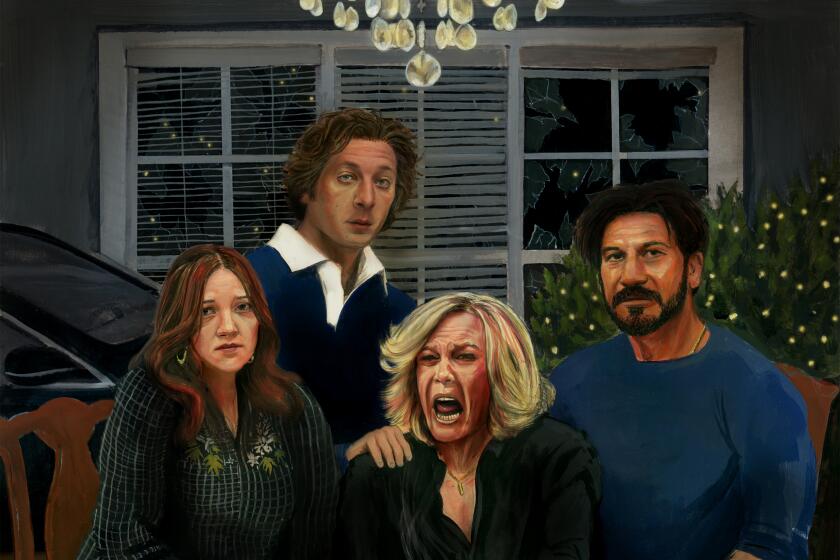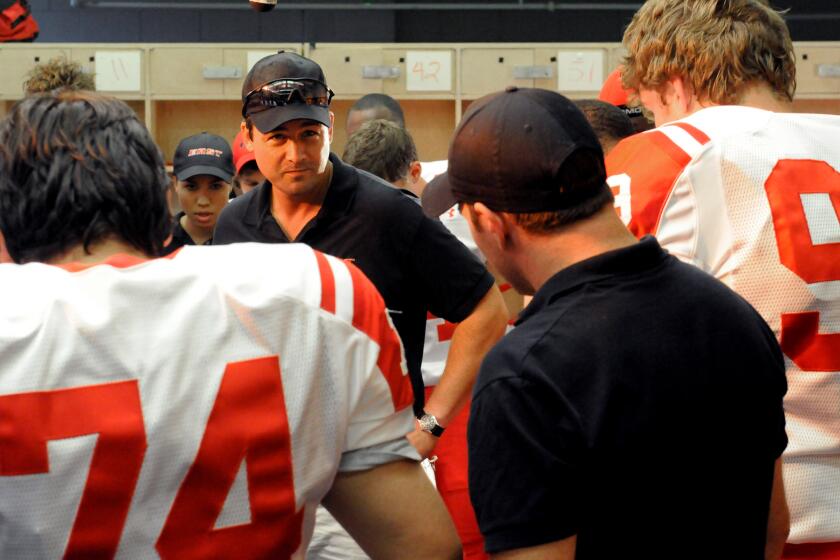Ambitious ‘OJ: Made in America’ examines race, class, celebrity and where O.J. Simpson fit in
Although the five-part, nearly eight-hour “O.J.: Made in America” got much of its exposure through a combined broadcast on ABC and ESPN, director Ezra Edelman always thought of it as “one long movie.” “For me personally, it’s as if it never aired on television,” he says. “There’s ways to watch this commercial-free, and that’s the way it’s meant to be absorbed.”
Even in the era of Peak TV, “Made in America’s” acute examination of race, class, gender and celebrity, and the roles they played in O.J. Simpson’s rise to fame, his trial and acquittal for murder, and his long, slow subsequent downfall, stands out for the scope of its ambitions. (One might even call them “cinematic.”) Since its Sundance premiere, most of “Made in America’s” theatrical screenings have been limited to film festivals, but qualifying runs have made it a bona fide Oscar contender, no matter what size screen you see it on.
You’ve said that the challenge of making a five-hour film — which ended up being closer to eight — interested you right away, but making one on the subject of O.J. Simpson did not. Why wasn’t O.J. interesting to you?
It was more I wasn’t interested in the obvious part of OJ’s story: Was he guilty of murder? One of the things I wanted to do was to flesh O.J. out as a character because I felt that who he was pre-1994 had been lost, if not completely forgotten. I understand if I’m doing a film about this, ultimately it gets to a point where there’s a murder and a trial. But for me, it was about exploring the journey to get to that point and elucidating what actually took place during those two years, versus just going to those two years to further mine territory that I felt had been overly mined.

Kenneth Turan reviews “O.J.: Made in America,” a 7 ½-hour documentary from ESPN’s “30 for 30.”
Who was O.J. Simpson to you as you were growing up?
If you right now knocked on my parents’ door in Washington, D.C., there’s a picture of my two older brothers, and they’re both wearing NFL jerseys. One’s wearing a Lynn Swann jersey, and one’s wearing an O.J. jersey. O.J. was very much in my consciousness as a child. I watched him run through airports every night on television [in the Hertz Rent-a-Car commercial]. When I was a child, that’s what I would do when I was in airports. If I were going to the gate, I would be side-stepping people in an airport as if I were O.J. He was this lovable celebrity, and he was one of the few black faces who was on TV. He just was someone who I lived with constantly, from the time I was 5 all the way up until the murders.
That’s part of what I feel has been forgotten, and in forgetting that, that’s where you lose the impact of the day of the Bronco chase. It wasn’t like, “Oh, yeah, it’s a guy who was a really good football player, and he was in ‘Naked Gun.’ ” If you look at the Book of Lists from 1977, he’s the No. 1 most popular person in America. No. 1. I think to get back to understanding the place that he held was pretty important in connecting with why we were all culturally so screwed up over the idea that this guy could have committed murder.
He had this incredible charisma. Even in the fifth part of the film, after the murder trial, people talk about being unable to resist his charm. They call it “getting O.J.’ed.”
You can actually see the O.J. charm come out during the interview with Wendy Williams, someone who interviews people for a living. It starts with a woman who clearly believes this guy’s guilty of murder, and is sort of hesitant about talking to him. By the end, she’s hugging him, and you’re like, “How the heck did that just happen?” That is my favorite scene in the entire movie, because even after all this, you see him at work, and he is that charming. That’s what he radiates, and that’s the effect that he has on people.
So much of what we see in the film is familiar; if you lived through the times, it all comes rushing back. But in that pre-YouTube era, many people only saw a piece of the tape of the LAPD officers beating Rodney King. You show the whole thing.
There’s a purposefulness to showing all the Rodney King footage, which is part of the general purpose of discussing the history as in-depth as we did. It’s for people who don’t know that history, or white people who don’t live with that dynamic on a day-to-day basis with police, to emotionally engage with that history, and with those incidents. When you get to the trial, it is emotional about African Americans’ investment in [O.J.’s] innocence. A lot of it’s personal, and it wasn’t necessarily intellectual in terms of parsing the evidence in the case. It’s emotional in terms of having gone through those experiences personally, and/or having family members or friends who have been victims of police injustice in some form. You’re obviously going to project that onto what is the most high-profile African American defendant, certainly in a murder trial, in American history. If a white viewer could connect for the first time emotionally with that history, with that dynamic, or for the first time understand why African Americans responded the way they did to the verdict, or why so many believed that he was innocent, that was very purposeful as far as why I was doing the film in the first place.
Before you included them in the film, we’d never seen the graphic crime-scene photos of Nicole Brown and Ronald Goldman’s bodies before, which really bring home how vicious these killings were. The film goes to great lengths to put the case in the context of the history of race in the U.S. and of Simpson himself, but those photos feel like a reminder that their deaths have to be dealt with on their own terms.
Because of everything that the trial became, how this case became about everything except the evidence itself, I think you needed to have a stark reminder of just how brutal of a crime this was. I think you needed, for the sake of the victims, to connect with that. For a lot of people who might have, for those emotional, personal, political reasons, been invested in or been convinced or desirous of O.J.’s innocence, I think it shocks you back into a place of, “Oh, this is actually about two people being murdered. Not about these other things.” I think it was easy to forget that.
See the most read stories this hour »
More to Read
From the Oscars to the Emmys.
Get the Envelope newsletter for exclusive awards season coverage, behind-the-scenes stories from the Envelope podcast and columnist Glenn Whipp’s must-read analysis.
You may occasionally receive promotional content from the Los Angeles Times.
